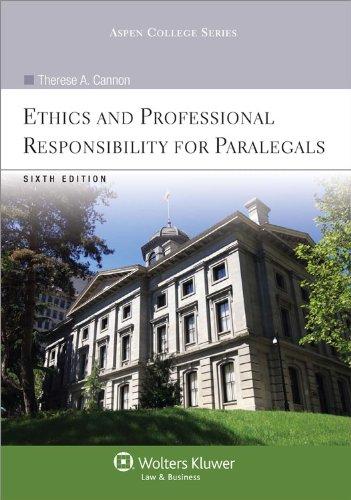Respondents Brooking and Moeves are principals in Brooking, Moeves & Halloran, P.L.L.C. (the Brooking firm), a law
Question:
Respondents Brooking and Moeves are principals in Brooking, Moeves & Halloran, P.L.L.C. (‘‘the Brooking firm’’), a law firm established in September 2004. . . . Respondent Mullaney was employed as an associate of the Brooking firm and its predecessors . . . from May 2004 until May 2006. Foreclosure Solutions, L.L.C., is a company located in Ohio that purports to serve homeowners threatened with foreclosure by helping them set up a savings plan, so that after the homeowners follow the plan, Foreclosure Solutions can use the money saved to negotiate with the lenders to reinstate the loan and avoid foreclosure.
In 2003, Moeves . . . worked out a deal with Timothy Buckley, president of Foreclosure Solutions, agreeing to represent Foreclosure Solutions’ customers in Kentucky courts. Pursuant to their agreement, Moeves began accepting clients from Foreclosure Solutions, who routinely obtained a limited power of attorney to hire an attorney for its customers, and Moeves collected a flat fee from Foreclosure Solutions of $125 for each client. With the formation of the Brooking firm in the fall of 2004, Moeves and Buckley extended their agreement to include representation of Foreclosure Solutions’ customers in Ohio courts. . . .
Foreclosure Solutions’ customers paid between $700 and $1,100 for the company’s services, the goal of which was to stall pending foreclosure proceedings while trying to negotiate a settlement with the lender. The company is not a licensed or accredited consumer-credit-counseling agency. Nor is Buckley or any of his employees, to the respondents’
knowledge, licensed to practice law in any jurisdiction.
Foreclosure Solutions advertised to attract customers and often sent advertisements to defendants listed on court foreclosure dockets. Agents of the company told prospective customers that an attorney and legal services would be furnished to them as part of their fee. The company then hired a lawyer for the customer-client to respond in court to the recently filed foreclosure action. The client had no choice in the lawyer’s selection, and after the lawyer was hired, Foreclosure Solutions’ agents continued to negotiate directly with the foreclosing creditors.
Foreclosure Solutions’ agents met with customers to collect the company’s fee and had the customer sign a standardized contract, the ‘‘Work Agreement,’’ containing the basic terms and conditions of the engagement. The agent also had the customer sign a standardized limited power of attorney appointing Foreclosure Solutions as the customer’s attorney-in-fact, which, in addition to authorizing the hiring of an attorney, allowed company agents to negotiate on the customer’s behalf with creditors. Neither the Work Agreement nor the limited power of attorney identified any particular lawyer, established when a lawyer was to be hired, or informed the client of the amount of the lawyer’s fee.
As the solution to a customer’s foreclosure troubles, the Work Agreement provided for the customer to set up a savings account and deposit a certain amount of money into it on a regular basis; Foreclosure Solutions would then use that money as a bargaining chip in negotiations with the creditor. Foreclosure Solutions determined the amount the client was to periodically deposit in the savings account. The Work Agreement specified that bankruptcy was considered a last resort.
Once the Foreclosure Solutions customer had signed the Work Agreement and limited power........
Questions about the Case 1 What were the individual ethics violations, and what facts support the court’s findings for each violation?
2 What specific conduct by Foreclosure Solutions constituted the practice of law?
3 What kinds of services could this company have provided to help people in danger of losing their homes without violating the UPL rules?
4 Could this law firm have worked out an arrangement with a foreclosure consulting firm that would be acceptable under the ethics rules? What might this arrangement look like?
5 Also see Cincinnati Bar Ass’n v. Foreclosure Solutions, 123 Ohio St. 3d 107 (2009), in which the company and the individuals who established it were found to have violated unauthorized-practice-of-law rules, were enjoined from engaging in further unethical conduct, and were fined $50,000.
Step by Step Answer:

Ethics And Professional Responsibility For Paralegals
ISBN: 272860
6th Edition
Authors: Therese A. Cannon





